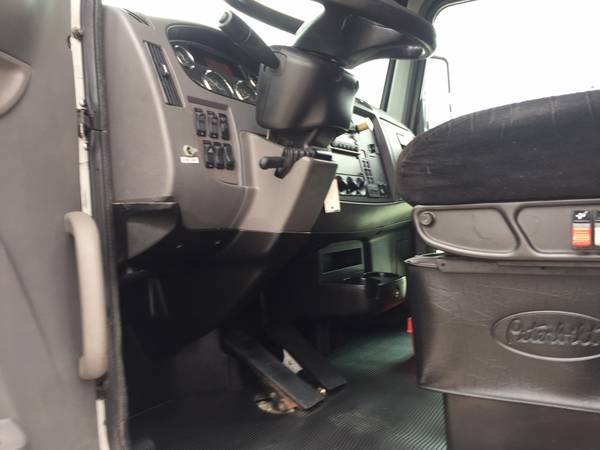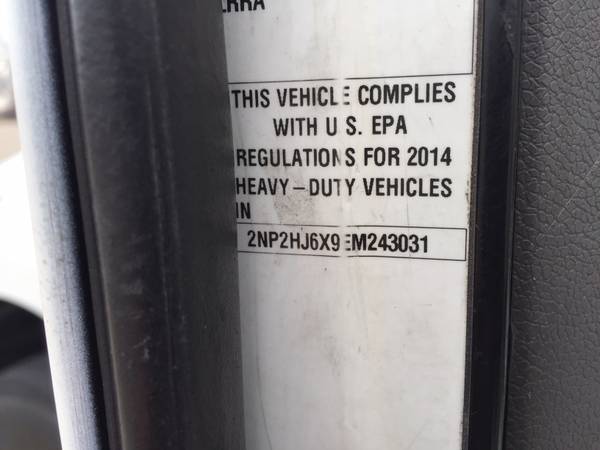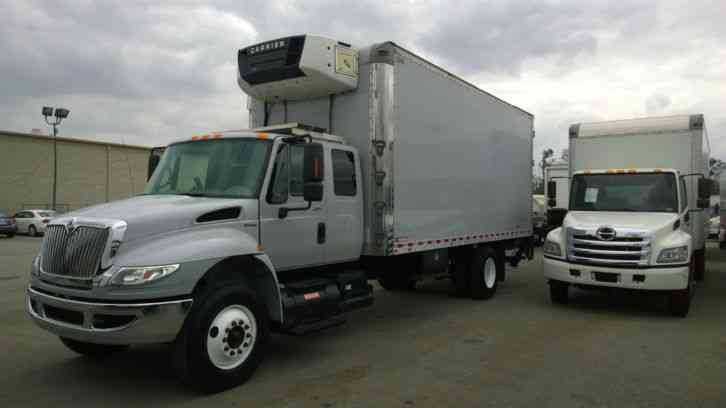Non CDL Reefer Box Trucks For Sale: Your Comprehensive Guide to Temperature-Controlled Mobility types.truckstrend.com
In the world of logistics and specialized transportation, the ability to move temperature-sensitive goods efficiently and legally is paramount. For many small businesses, independent operators, and local delivery services, the solution often lies in a specific type of vehicle: the Non-CDL Reefer Box Truck. These versatile workhorses offer the crucial combination of refrigerated cargo space and the accessibility of not requiring a Commercial Driver’s License (CDL), opening doors for a wider range of entrepreneurs.
This comprehensive guide will delve into everything you need to know about Non-CDL reefer box trucks for sale, from understanding their core features to navigating the buying process, ensuring you make an informed decision for your business needs.
Non CDL Reefer Box Trucks For Sale: Your Comprehensive Guide to Temperature-Controlled Mobility
What Exactly is a Non-CDL Reefer Box Truck?
At its core, a "reefer" (short for refrigerated) box truck is a vehicle designed with an insulated cargo area and a refrigeration unit to maintain a specific temperature range, from chilled to frozen. The "Non-CDL" distinction is crucial: it means the truck’s Gross Vehicle Weight Rating (GVWR) is typically under 26,001 pounds. This allows individuals with a standard driver’s license (Class D in most states) to operate them, significantly lowering the barrier to entry for many businesses and owner-operators.
These trucks typically range in size from 14 feet to 24 feet in box length, mounted on a chassis that can be powered by gasoline or diesel engines. They are engineered to transport perishable goods such as food products, pharmaceuticals, flowers, and chemicals, ensuring product integrity from origin to destination.
Who Benefits from a Non-CDL Reefer Box Truck?
The versatility and accessibility of Non-CDL reefer box trucks make them indispensable for a diverse array of businesses and individuals:
- Small Food Businesses: Caterers, bakeries, food truck operators, farmers’ market vendors, and artisanal food producers rely on them to transport ingredients and finished products safely.
- Flower Shops and Nurseries: Maintaining the freshness of delicate floral arrangements and plants during transit is critical.
- Pharmaceutical and Medical Supply Companies: Delivering temperature-controlled medications, vaccines, and laboratory samples is often a legal and ethical requirement.
- Local Delivery Services: Businesses specializing in last-mile delivery of groceries, meal kits, or other perishables find these trucks ideal for urban and suburban routes.
- Independent Owner-Operators: For those looking to enter the specialized freight market without the significant investment and training required for a CDL, these trucks offer an excellent entry point.
- Event Planners: Transporting temperature-sensitive food and beverages for large-scale events or outdoor gatherings.

Key Features and Components to Look For
When considering Non-CDL reefer box trucks for sale, understanding their key components and features is vital for making the right choice:
- Refrigeration Unit: This is the heart of the reefer. Look for reputable brands like Thermo King or Carrier. Assess its temperature range capabilities (e.g., chill only, frozen, deep freeze), the number of hours on the unit, and if it has a "standby" option for plugging into shore power.
- Insulation and Box Condition: The integrity of the insulated box is paramount. Check for damage, cracks, or gaps in the insulation, which can compromise temperature control. Examine the interior walls, floor (some have ribbed aluminum for airflow, or drains for easy cleaning), and ceiling.
- Doors: Determine if you prefer roll-up or swing doors. Swing doors generally offer a better seal for temperature retention, while roll-up doors are convenient for tight spaces.
- Chassis and Drivetrain: Inspect the truck’s chassis, including the engine (gasoline engines are common for non-CDL, but diesel offers better fuel economy for heavier loads), transmission, mileage, and overall maintenance history. A well-maintained engine means longevity and reliability.
- Gross Vehicle Weight Rating (GVWR): Always confirm the GVWR to ensure it falls below the 26,001 lbs threshold for non-CDL operation. This rating includes the truck’s weight, fuel, driver, passengers, and cargo.
- Liftgate: Many reefer trucks come equipped with a liftgate, which is incredibly useful for loading and unloading heavy or bulky items without a loading dock. Assess its condition and lifting capacity.
- Overall Condition: Beyond the specialized reefer components, perform a general inspection for rust, body damage, tire wear, working lights, and brake condition.

Where to Find Non-CDL Reefer Box Trucks For Sale
The market for these specialized vehicles is robust, offering several avenues for potential buyers:
- Online Marketplaces: Websites like TruckPaper.com, CommercialTruckTrader.com, My Little Salesman, eBay Motors, and even Facebook Marketplace are excellent resources for finding both new and used trucks from dealers and private sellers.
- Commercial Truck Dealerships: Both new and used truck dealerships often carry a selection of reefer box trucks. They can offer financing options, warranties, and pre-purchase inspections.
- Auctions: Government surplus auctions (e.g., GovDeals), commercial truck auctions (e.g., Ritchie Bros.), and public auctions can be sources for good deals, but require a keen eye for detail and often "as-is" purchases.
- Private Sellers: Check local classifieds, industry forums, or simply network within your business community. Buying privately can sometimes yield better prices, but often means less recourse if issues arise.
- Fleet Sales: Larger companies or rental agencies sometimes sell off older vehicles from their fleet.
Important Considerations Before Buying
Purchasing a Non-CDL reefer box truck is a significant investment. Consider these factors carefully:
- Budget & Operating Costs: Beyond the purchase price, factor in fuel costs (reefer units consume fuel even when stationary if running), insurance, maintenance, repairs, and potential depreciation.
- Payload Capacity: Ensure the truck’s payload capacity (GVWR minus the truck’s curb weight) is sufficient for your typical loads without exceeding legal limits.
- Temperature Requirements: Be precise about the temperature range you need to maintain. Some units are designed for chill, while others can handle deep freeze.
- Maintenance History: Demand detailed maintenance records, especially for the refrigeration unit and engine. A well-documented history indicates responsible ownership and can save you from costly surprises.
- Pre-Purchase Inspection: This is non-negotiable. Hire an independent, qualified mechanic specializing in commercial trucks and refrigeration units to perform a thorough inspection before finalizing any purchase.
- Financing and Insurance: Explore financing options early. Obtain insurance quotes specifically for commercial vehicles with refrigeration units, as they may differ from standard truck policies.
- Regulatory Compliance: Understand state and federal Department of Transportation (DOT) regulations, even for non-CDL vehicles. Regular inspections may be required.
Tips for a Successful Purchase
- Define Your Needs: Before you start looking, clearly outline the size, temperature range, typical load weight, and budget you require.
- Research Thoroughly: Compare models, brands, and prices across various platforms. Read reviews and seek advice from experienced operators.
- Don’t Rush: Take your time to find the right truck. A hasty decision can lead to buyer’s remorse and significant financial setbacks.
- Negotiate: Always be prepared to negotiate the price, especially with private sellers or at auctions.
- Factor in Post-Purchase Costs: Allocate funds for registration, initial servicing, and any immediate repairs or upgrades the truck might need.
- Test the Reefer Unit: Run the refrigeration unit for an extended period (at least an hour) to ensure it reaches and maintains the desired temperature without issues. Listen for unusual noises.
Potential Challenges and Solutions
While Non-CDL reefer trucks offer great advantages, they also come with specific challenges:
- High Fuel Costs: Reefer units consume fuel, adding to operational expenses. Solution: Optimize delivery routes, ensure the reefer unit is well-maintained for efficiency, and consider models with more fuel-efficient engines or standby power options.
- Refrigeration Unit Malfunctions: A breakdown can lead to significant product loss. Solution: Implement a strict preventative maintenance schedule for the reefer unit, and have a list of emergency repair contacts.
- Finding Qualified Mechanics: Not all mechanics are familiar with commercial refrigeration units. Solution: Seek out specialized truck and reefer repair shops. Build a relationship with a trusted technician.
- Depreciation: Like all vehicles, these trucks depreciate. Solution: Account for depreciation in your business plan and factor it into your pricing strategy.
- Insurance Costs: Specialized vehicles can have higher insurance premiums. Solution: Shop around with multiple commercial insurance providers to compare rates and coverage. Maintain a clean driving record.
Non-CDL Reefer Box Trucks For Sale: Estimated Price Guide
Prices for Non-CDL reefer box trucks vary significantly based on age, condition, mileage, brand, and features. This table provides a general estimation:
| Truck Size (Box Length) | Age/Condition Category | Estimated Price Range (USD) | Key Factors Affecting Price |
|---|---|---|---|
| 14-16 ft | New | $65,000 – $95,000+ | Chassis brand, engine type, reefer unit specs, liftgate |
| Used (Good) | $35,000 – $65,000 | Low mileage, well-maintained, newer reefer unit | |
| Used (Fair) | $15,000 – $35,000 | Higher mileage, older reefer unit, minor cosmetic wear | |
| 18-20 ft | New | $75,000 – $110,000+ | Larger capacity, advanced reefer features, premium chassis |
| Used (Good) | $40,000 – $75,000 | Excellent mechanical condition, good reefer hours, recent service | |
| Used (Fair) | $20,000 – $40,000 | Moderate wear, potential need for minor repairs, older model year | |
| 22-24 ft | New | $85,000 – $130,000+ | Max non-CDL size, heavy-duty chassis, powerful reefer |
| Used (Good) | $50,000 – $85,000 | Strong engine, well-insulated, reliable reefer unit | |
| Used (Fair) | $25,000 – $50,000 | Higher hours, visible wear and tear, older refrigeration tech |
Note: These are estimates. Prices can fluctuate based on market demand, regional differences, and specific features (e.g., multi-temp zones, specialized flooring).
Frequently Asked Questions (FAQ)
Q1: Do I really not need a CDL for these trucks?
A1: Yes, provided the truck’s Gross Vehicle Weight Rating (GVWR) is below 26,001 pounds. Always verify the GVWR on the truck’s specifications or door jamb sticker to ensure it falls within the non-CDL limit.
Q2: What’s the typical fuel efficiency of a Non-CDL reefer truck?
A2: Fuel efficiency varies greatly based on engine type (gas vs. diesel), truck size, load weight, driving conditions, and how often the reefer unit runs. Generally, you can expect anywhere from 8 to 14 miles per gallon (MPG), but the reefer unit’s fuel consumption must also be factored in.
Q3: How often do reefer units need maintenance?
A3: Refrigeration units typically require annual preventative maintenance, or more frequently depending on usage hours. It’s also wise to have them checked before peak seasons or long trips. Regular maintenance is key to preventing costly breakdowns and ensuring efficient operation.
Q4: Can I convert a regular box truck into a reefer truck?
A4: While technically possible to add insulation and a refrigeration unit to a standard box truck, it’s often not cost-effective or as efficient as a purpose-built reefer. The insulation and structural integrity of factory-built reefer boxes are superior, and aftermarket conversions may not hold temperatures as effectively.
Q5: What is the average lifespan of a reefer unit?
A5: With proper maintenance, a refrigeration unit can last 10,000 to 20,000 operating hours, or roughly 10 to 15 years. However, factors like climate, frequency of use, and maintenance history significantly impact its lifespan.
Conclusion
Non-CDL reefer box trucks represent an incredible opportunity for businesses and individuals needing reliable, temperature-controlled transportation without the complexities of a CDL. Their versatility supports a wide array of industries, from local food delivery to pharmaceutical distribution. By understanding the key features, knowing where to search, diligently considering all financial and operational aspects, and conducting thorough inspections, you can confidently navigate the market for these essential vehicles. A well-chosen Non-CDL reefer truck isn’t just a purchase; it’s an investment in the integrity of your products and the growth of your business.

